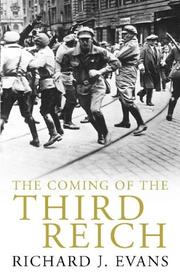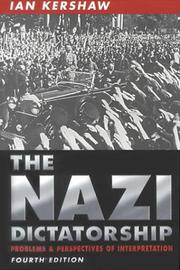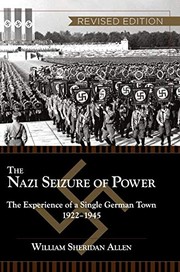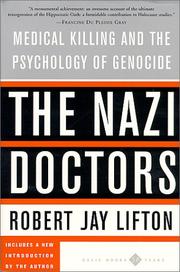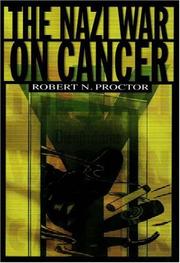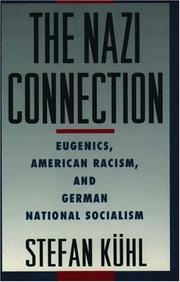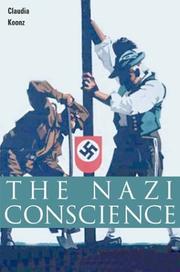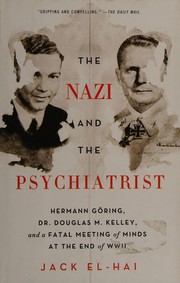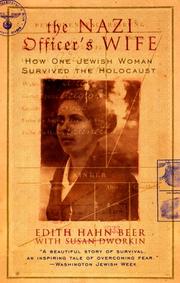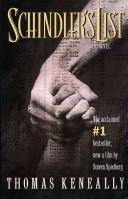Looking for a captivating read about one of the darkest periods in history? Dive into the world of World War II and the atrocities committed by the Nazis with these 20 best books about Nazis. From gripping historical accounts to powerful memoirs and compelling fiction, these books offer a deep insight into the rise of the Third Reich, the Holocaust, and the individuals who fought against the tyranny. Whether you’re a history buff or simply seeking a thought-provoking book on Nazis, these selections will leave a lasting impression.
Contents
- 1 20 Best Books About Nazis
- 2 The Rise and Fall of the Third Reich
- 3 Hitler: A Biography
- 4 The Nazi Hunters
- 5 The Coming of the Third Reich
- 6 The Nazi Dictatorship: Problems and Perspectives of Interpretation
- 7 The Nazi Seizure of Power: The Experience of a Single German Town, 1922-1945
- 8 Hitler’s Furies: German Women in the Nazi Killing Fields
- 9 The Third Reich in Power
- 10 The Nazi Persecution of the Churches, 1933-1945
- 11 The Nazi Doctors: Medical Killing and the Psychology of Genocide
- 12 Hitler’s Willing Executioners: Ordinary Germans and the Holocaust
- 13 The Nazi War on Cancer
- 14 The Nazi Connection: Eugenics, American Racism, and German National Socialism
- 15 The Nazi Conscience
- 16 The Nazi Party: A Social Profile of Members and Leaders, 1919-1945
- 17 The Nazi and the Psychiatrist: Hermann Göring, Dr. Douglas M. Kelley, and a Fatal Meeting of Minds at the End of WWII
- 18 The Nazi Officer’s Wife: How One Jewish Woman Survived the Holocaust
- 19 The Diary of a Young Girl
- 20 Schindler’s List
- 21 Night
- 22 Conclusion
- 23
- 24 Discover Best Summer Romances Books: 20 Key Titles, 2024 Updated
- 25 Books on Misfits: 2024 Update of the Best Titles
- 26 Books about Guerrillwarfare: 2024 Updated Guide to Essential Reading
20 Best Books About Nazis
The Rise and Fall of the Third Reich
by William L. Shirer
The Rise and Fall of the Third Reich is a seminal book on the Nazis and their impact on world history. Written by William L. Shirer, this comprehensive account provides a detailed analysis of the rise of Adolf Hitler and the Nazi Party, their ruthless rule over Germany, and their eventual downfall. Shirer’s meticulously researched narrative offers a vivid portrayal of the key figures, events, and ideologies that shaped the Third Reich, making it an indispensable read for anyone interested in understanding the complexities of this dark period in history. With its gripping storytelling and insightful commentary, this book about Nazis remains a timeless and essential resource for those seeking to comprehend the horrors and consequences of totalitarianism.
Hitler: A Biography
by Ian Kershaw
Hitler: A Biography by Ian Kershaw is a compelling and comprehensive book on the leader of the Third Reich. Kershaw delves into the life and rise of Adolf Hitler, from his early days to his transformation into a dictator. The biography provides a deep understanding of Hitler’s character, motivations, and the political climate that allowed the Nazis to seize power in Germany. Kershaw’s meticulous research and engaging writing style make this book about the Nazis a must-read for anyone interested in understanding the history of the 20th century. This biography offers a nuanced and insightful portrayal of one of the most infamous figures in history, shedding light on the complexities of Hitler’s personality and the events that led to the devastating impact of his rule.
The Nazi Hunters
by Andrew Nagorski
The Nazi Hunters by Andrew Nagorski is a gripping and insightful book on the relentless pursuit of justice after World War II. Nagorski delves into the stories of the individuals and organizations who dedicated themselves to tracking down and bringing to trial the perpetrators of the Holocaust and other Nazi atrocities. Through his meticulous research and compelling storytelling, Nagorski presents a compelling account of the tireless efforts of these dedicated individuals to bring war criminals to justice, often against the backdrop of a world still grappling with the aftermath of the war. This book about Nazis is a powerful testament to the resilience of the human spirit and the enduring quest for accountability and closure. The Nazi Hunters is a must-read for anyone interested in history, justice, and the pursuit of truth.
The Coming of the Third Reich
by Richard J. Evans
The Coming of the Third Reich by Richard J. Evans is a gripping and comprehensive exploration of the rise of the Nazi party in Germany. This meticulously researched book delves into the political, social, and economic factors that paved the way for the Nazis to seize power. Evans skillfully uncovers the complex web of events and ideologies that led to the devastating consequences of Hitler’s regime. Through vivid storytelling and insightful analysis, the author offers a compelling account of the turbulent years that preceded the Third Reich. This book about nazis is an essential read for anyone seeking to understand the forces that shaped one of the darkest periods in human history.
The Nazi Dictatorship: Problems and Perspectives of Interpretation
by Ian Kershaw
The Nazi Dictatorship: Problems and Perspectives of Interpretation by Ian Kershaw is a comprehensive and insightful book on the Third Reich. Kershaw, a renowned historian, delves into the complexities of the Nazi regime, exploring the key issues and debates surrounding its rise and fall. The book offers a thought-provoking analysis of Hitler’s dictatorship, examining the social, economic, and political factors that contributed to its establishment and maintenance. Kershaw’s nuanced approach provides readers with a deeper understanding of the Nazi era, challenging traditional interpretations and offering new perspectives on the subject. Whether you’re a history enthusiast or a student of the period, this book about nazis is a must-read for anyone seeking a thorough examination of one of the most notorious regimes in history.
The Nazi Seizure of Power: The Experience of a Single German Town, 1922-1945
by William Sheridan Allen
The Nazi Seizure of Power: The Experience of a Single German Town, 1922-1945 by William Sheridan Allen is a gripping and insightful book about the rise of the National Socialist German Workers’ Party. Allen provides a detailed account of how the Nazi party gained control and transformed the town of Thalburg, illuminating the larger implications of their rise to power. Through meticulous research and compelling narrative, Allen uncovers the personal experiences of the town’s residents during this tumultuous period, shedding light on the societal and political forces at play. This book offers a unique perspective on the Nazis’ ascent to power, making it an essential read for anyone interested in understanding the dynamics of this dark chapter in history. The Nazi Seizure of Power is a thought-provoking and illuminating exploration of a crucial moment in 20th-century history.
Hitler’s Furies: German Women in the Nazi Killing Fields
by Wendy Lower
Hitler’s Furies: German Women in the Nazi Killing Fields by Wendy Lower is a gripping and harrowing exploration of the role of German women in the atrocities of the Nazi regime. Lower delves into the stories of ordinary women who became willing participants in the mass murder of Jews, Poles, and other victims of the Holocaust. Through meticulous research and compelling storytelling, the book sheds light on the overlooked and often underestimated role of women in the Nazi killing machine. This powerful and thought-provoking book on Nazis challenges traditional notions of gender and complicity in wartime atrocities, offering a haunting and unforgettable account of the female perpetrators of the Holocaust.
The Third Reich in Power
by Richard J. Evans
The Third Reich in Power is a comprehensive and compelling book about the Nazis’ rise to power and their rule in Germany from 1933 to 1939. Richard J. Evans delves into the political, social, and cultural aspects of this period, providing a detailed account of how the Nazis consolidated their control and implemented their oppressive policies. Through meticulous research and vivid storytelling, Evans brings to life the inner workings of the Nazi regime, shedding light on its propaganda machine, repressive measures, and the impact on the daily lives of ordinary people. This book offers a chilling and insightful look into one of the darkest chapters in history, making it an essential read for anyone seeking to understand the complexities of the Nazi era.
The Nazi Persecution of the Churches, 1933-1945
by J.S. Conway
The Nazi Persecution of the Churches, 1933-1945 by J.S. Conway is a compelling and comprehensive book about the systematic assault on religious institutions and believers by the Third Reich. This well-researched and engaging work delves into the various tactics used by the Nazis to undermine, control, and ultimately suppress the influence of the Christian churches in Germany during the tumultuous years of Nazi rule. Conway’s exploration of this dark chapter in history offers a nuanced understanding of the complexities and challenges faced by the churches as they navigated the oppressive Nazi regime. Through meticulous examination of primary sources and historical accounts, the book sheds light on the resistance efforts and moral dilemmas of religious leaders and congregations. The Nazi Persecution of the Churches, 1933-1945 is an essential read for anyone seeking to understand the multifaceted impact of the Nazis on religious freedom and the enduring legacy of this period.
The Nazi Doctors: Medical Killing and the Psychology of Genocide
by Robert Jay Lifton
The Nazi Doctors: Medical Killing and the Psychology of Genocide by Robert Jay Lifton is a chilling exploration of the role of doctors in the atrocities committed by the Third Reich. Lifton delves into the psychological manipulation and moral corruption that allowed medical professionals to participate in the mass murder of millions. Through extensive research and interviews with former Nazi doctors, Lifton uncovers the ways in which these individuals were able to rationalize their actions and become complicit in the genocide. This groundbreaking book sheds light on the disturbing intersection of medicine and Nazism, and forces readers to confront the ethical implications of the profession. The Nazi Doctors is a harrowing and thought-provoking examination of the darkest chapter in human history, and a crucial reminder of the dangers of unchecked power and moral compromise.
Hitler’s Willing Executioners: Ordinary Germans and the Holocaust
by Daniel Jonah Goldhagen
Hitler’s Willing Executioners: Ordinary Germans and the Holocaust by Daniel Jonah Goldhagen is a groundbreaking book that delves into the disturbing question of how ordinary Germans became willing participants in the atrocities of the Holocaust. Goldhagen challenges the widely held belief that the Nazis’ actions were carried out by a small group of fanatics, arguing instead that a deep-seated anti-Semitic ideology was widespread among ordinary Germans, making them willing executioners of Hitler’s genocidal policies. This meticulously researched and thought-provoking book offers a chilling insight into the psychology of mass violence and raises important questions about the nature of evil and complicity. Goldhagen’s compelling narrative and compelling arguments make this a must-read for anyone seeking to understand the complexities of the Holocaust and the role of ordinary people in perpetrating such heinous crimes.
The Nazi War on Cancer
by Robert N. Proctor
The Nazi War on Cancer by Robert N. Proctor is a groundbreaking book on the Nazis’ efforts to combat cancer. Proctor delves into the disturbing intersection of science and politics during the Third Reich, revealing how the Nazis exploited anti-tobacco and anti-cancer campaigns for their own propaganda and eugenics agenda. The book exposes the paradoxical nature of the Nazi regime, which, while promoting health initiatives, also engaged in genocide and medical experimentation. Proctor’s meticulous research and compelling narrative shed light on a little-known aspect of Nazi history, challenging our understanding of the regime’s motivations and methods. The Nazi War on Cancer is a must-read for anyone interested in the history of medicine, World War II, or the complex dynamics of power and ideology.
The Nazi Connection: Eugenics, American Racism, and German National Socialism
by Stefan Kühl
The Nazi Connection: Eugenics, American Racism, and German National Socialism by Stefan Kühl provides a gripping exploration of the interwoven history of eugenics, American racism, and German National Socialism. This thought-provoking book delves into the connections between the ideologies of racism and eugenics in both the United States and Germany, shedding light on the disturbing influence of these ideas on the development of Nazi policies. Kühl uncovers the collaboration and exchange of ideas between American and German scientists, politicians, and eugenicists, revealing the unsettling parallels between the two nations’ approaches to racial purity and societal engineering. Through meticulous research and compelling storytelling, Kühl exposes the troubling origins of Nazi ideology and its connections to American eugenics, making this a must-read for anyone interested in understanding the complex history of racism and its impact on the rise of the Nazis.
The Nazi Conscience
by Claudia Koonz
The Nazi Conscience by Claudia Koonz is a thought-provoking exploration of the moral and psychological dimensions of Nazi ideology. This compelling book delves into the inner workings of the Nazi regime, shedding light on how ordinary individuals were drawn into the web of Nazi atrocities. Koonz examines how the Nazis manipulated societal norms and moral values to justify their heinous actions, providing an insightful analysis of the psychology of obedience and complicity. With meticulous research and powerful storytelling, The Nazi Conscience offers a chilling glimpse into the inner world of the Third Reich, making it an essential read for anyone seeking to understand the complexities of Nazi ideology and the human capacity for evil.
The Nazi Party: A Social Profile of Members and Leaders, 1919-1945
by Michael H. Kater
The Nazi Party: A Social Profile of Members and Leaders, 1919-1945 by Michael H. Kater is a comprehensive examination of the individuals who were part of the Nazi regime. Kater delves into the social and psychological aspects of the members and leaders of the Nazis, providing insight into the motivations and characteristics of those who were part of one of the most infamous political movements in history. This book offers a unique perspective on the inner workings of the Nazi party, shedding light on the diverse backgrounds and ideologies of its members. Kater’s meticulous research and analysis make this a fascinating and essential read for anyone interested in understanding the complexities of the Nazi party and the individuals who shaped its trajectory. For those seeking a deeper understanding of the Nazis, this book is a valuable resource.
The Nazi and the Psychiatrist: Hermann Göring, Dr. Douglas M. Kelley, and a Fatal Meeting of Minds at the End of WWII
by Jack El-Hai
The Nazi and the Psychiatrist is a captivating book about the intersection of power, psychology, and the aftermath of WWII. Author Jack El-Hai delves into the chilling encounters between Hermann Göring, a high-ranking Nazi official, and Dr. Douglas M. Kelley, an American psychiatrist tasked with evaluating Göring’s mental state during the Nuremberg trials. Through meticulous research and compelling storytelling, El-Hai unveils the complex dynamics between the two men and the fatal consequences of their interactions. This book offers a gripping exploration of the inner workings of the Nazi regime and the psychological aftermath of war, making it a must-read for anyone interested in history, psychology, or the human condition.
The Nazi Officer’s Wife: How One Jewish Woman Survived the Holocaust
by Edith H. Beer
The Nazi Officer’s Wife: How One Jewish Woman Survived the Holocaust by Edith H. Beer is a gripping memoir that offers a unique perspective on life during the Nazi regime. This powerful book details Edith’s harrowing experiences as she navigates the dangers of being a Jewish woman married to a high-ranking Nazi officer. Through her incredible resilience and courage, Edith manages to evade detection and survive the horrors of the Holocaust. Her story sheds light on the complexities of human relationships and the lengths one will go to in order to survive. This book about Nazis provides a compelling account of one woman’s determination and strength in the face of unimaginable adversity, making it a must-read for anyone interested in this period of history.
The Diary of a Young Girl
by Anne Frank
The Diary of a Young Girl is a poignant and haunting account of a young Jewish girl’s life during the Nazi occupation of the Netherlands. Anne Frank, a spirited and insightful teenager, documents her daily experiences, thoughts, and emotions while hiding with her family in a secret annex. Her diary provides a unique and intimate perspective on the horrors of the Holocaust, as well as the resilience and hope of the human spirit in the face of unimaginable adversity. This timeless classic offers a powerful and personal insight into one of the darkest periods in history, and serves as a reminder of the importance of tolerance, understanding, and compassion.
Schindler’s List
by Thomas Keneally
Schindler’s List by Thomas Keneally is a powerful and moving historical novel that tells the true story of Oskar Schindler, a German businessman who saved the lives of over a thousand Jewish refugees during the Holocaust. Set against the backdrop of World War II, the book provides a harrowing and poignant account of the atrocities committed by the Nazis, as well as the incredible acts of bravery and compassion displayed by Schindler. Through vivid storytelling, Keneally brings to life the horrors of the Holocaust and the resilience of the human spirit in the face of unimaginable adversity. This compelling and thought-provoking book about Nazis serves as a reminder of the importance of standing up against injustice and the capacity for heroism in the darkest of times.
Night
by Elie Wiesel
Night by Elie Wiesel is a haunting memoir that chronicles the author’s experiences as a young Jewish boy in Nazi-occupied Europe during the Holocaust. This powerful book about Nazis delves into the horrors of the concentration camps, the loss of family, and the struggle for survival in the face of unimaginable suffering. Wiesel’s poignant and vivid storytelling brings to life the atrocities committed during this dark period in history, offering a firsthand account of the brutality and inhumanity inflicted upon the Jewish people. Through his harrowing narrative, Wiesel sheds light on the resilience of the human spirit and the enduring power of hope, making Night a must-read for those seeking to understand the impact of the Holocaust and the indomitable strength of the human spirit.
Conclusion
In conclusion, these 20 books about Nazis offer a comprehensive and insightful look into one of the darkest periods in human history. From personal memoirs to historical analyses, these books provide a deep understanding of the Nazi regime and its impact on the world. Whether you’re a history enthusiast or simply looking to educate yourself, these books are essential reads that shed light on a crucial chapter in our past.
Which Nazis book is best?
The best book on Nazis can vary with personal preference, but three widely recommended titles are:
- The Rise and Fall of the Third Reich by William L. Shirer,
- Hitler: A Biography by Ian Kershaw,
- The Nazi Hunters by Andrew Nagorski.
Each offers valuable insights and could be a great starting point.
What are the best books to learn about Nazis?
For those looking to learn about Nazis, there is a wealth of literature that can provide a comprehensive understanding of the subject. Some of the most highly recommended books include:
- The Rise and Fall of the Third Reich by William L. Shirer,
- Hitler: A Biography by Ian Kershaw,
- The Nazi Hunters by Andrew Nagorski,
- The Coming of the Third Reich by Richard J. Evans,
- The Nazi Dictatorship: Problems and Perspectives of Interpretation by Ian Kershaw,
- The Nazi Seizure of Power: The Experience of a Single German Town, 1922-1945 by William Sheridan Allen,
- Hitler’s Furies: German Women in the Nazi Killing Fields by Wendy Lower,
- The Third Reich in Power by Richard J. Evans,
- The Nazi Persecution of the Churches, 1933-1945 by J.S. Conway,
- The Nazi Doctors: Medical Killing and the Psychology of Genocide by Robert Jay Lifton
These books offer a range of perspectives on Nazis, covering various aspects and approaches to the subject.
What are the best books on Nazis?
The best books on Nazis include:
- The Rise and Fall of the Third Reich by William L. Shirer,
- Hitler: A Biography by Ian Kershaw,
- Hitler’s Willing Executioners: Ordinary Germans and the Holocaust by Daniel Jonah Goldhagen,
- The Nazi War on Cancer by Robert N. Proctor,
- The Third Reich in Power by Richard J. Evans,
- The Nazi Seizure of Power: The Experience of a Single German Town, 1922-1945 by William Sheridan Allen.
Each offers unique insights into the subject. While these books on the topic of Nazis are highly regarded, it’s important to note that any list of ‘best’ books is subjective and reflects a range of opinions.
What are the best Nazis books of all time?
Choosing the best Nazis books of all time can vary depending on who you ask, but seven titles that are often celebrated include
- The Rise and Fall of the Third Reich by William L. Shirer,
- Hitler: A Biography by Ian Kershaw,
- The Nazi Dictatorship: Problems and Perspectives of Interpretation by Ian Kershaw,
- The Third Reich in Power by Richard J. Evans,
- The Nazi Doctors: Medical Killing and the Psychology of Genocide by Robert Jay Lifton,
- The Nazi War on Cancer by Robert N. Proctor,
- and Hitler’s Willing Executioners: Ordinary Germans and the Holocaust by Daniel Jonah Goldhagen.
Each of these books has made a significant impact in the field of Nazis and continues to be influential today.




